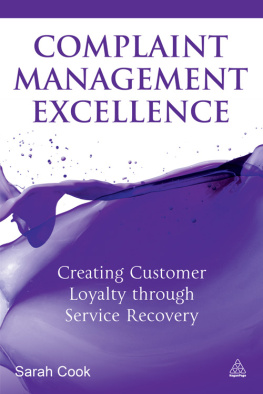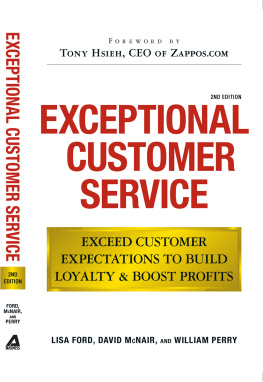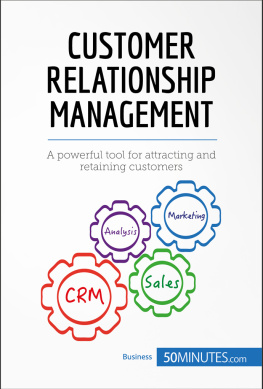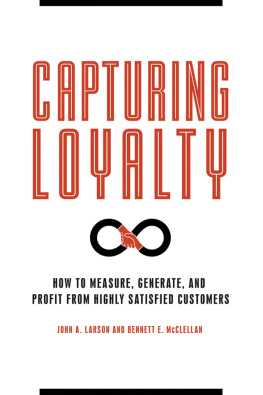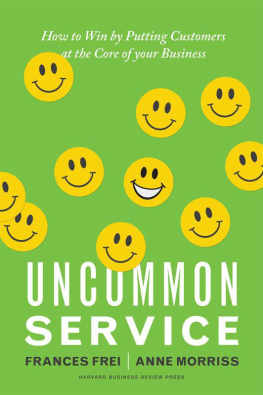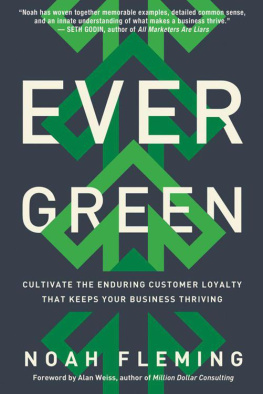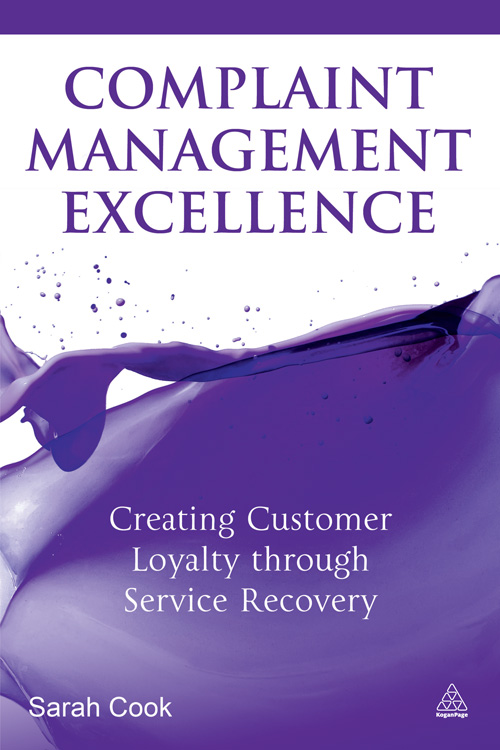Note on the Ebook Edition For an optimal reading experience, please view large
tables and figures in landscape mode. |
This ebook published in 2011 by
Kogan Page Limited
120 Pentonville Road
London N1 9JN
UK
www.koganpage.com
Sarah Cook, 2012
E-ISBN 978 0 7494 6531 5
CONTENTS
LIST OF FIGURES AND TABLES
Figures
Table
PREFACE
I n the global economy customers expectations are continually rising. However, many businesses fail to deliver against expectations. Whereas in the past customers have not always been forthcoming in expressing their dissatisfaction, today they are more vocal and informed of their rights. The growth of social media has also played a part in shaping customers views and opinions. Companies that do not manage customer dissatisfaction well, risk not only losing existing customers but alienating potential ones.
Yet research shows that when companies deal with complaints well they actively encourage loyalty. In fact a customer who has complained and whose complaint is dealt with well is more likely to be an advocate of a business than a customer who has not complained at all.
My aim in Complaint Management Excellence is to provide practical advic e, tools and techniques for managers to effectively manage complaints in their organization. Rather than seeing complaining customers as a nuisanc e, best practice is to view complaints as an opportunity to put things right, not just for the complainant but also for other customers. This improves the lon g-term prospects of the company, not only by increasing customer service levels and enhancing products and services but also by improving employee moral e and engagement.
The reality is that even the best of companies sometimes get things wrong. In order to arrive at a culture where complaints are welcomed, the underlying values, processes, structure, strategy and people in an organization need to be aligned to customer needs.
This book provides practical examples, case studies and research from across the globe about how to manage complaints effectively and engender an organizational culture that is customer focused. I hope that you find the book insightful and useful.
Sarah Cook
The Stairway Consultancy Ltd
sarah@thestairway.co.uk
www.thestairway.co.uk
ABOUT THE AUTHOR
S arah Cook is the Managing Director of The Stairway Consultancy Ltd. She has 20 years consulting experience specializing in customer service and culture change. Prior to this Sarah worked for Unilever and as Head of Customer Care for a retail consultancy.
Sarah has wide experience of helping public and private sector organizatio ns improve their complaint management and customer service. She works in the UK and on a global basis.
Sarah regularly speaks at conferences on customer service, complaint management and culture change. She is a business author with 35 books and manuals published. Other titles published by Kogan Page include:
Customer Care Excellence;
Practical Guide to Employee Engagement;
Change Management Excellence.
Sarah has an MA in modern languages from Cambridge University, and gained an MBA in 1991. She is a Fellow of the Chartered Institute of Personnel Development and a Chartered Marketer. Sarah is a judge at the National Customer Service Awards. She is passionate about excellent service.
Welcome to Complaint Management Excellence.
In this first chapter I set out:
t he social, technological, political and economic factors that are changing customer expectations of the service they experience;
h ow this is impacting on customer satisfaction and the complaints customers make to organizations;
w hy complaints are important to organizations, and the risks associated with handling complaints badly;
w hy best-practice organizations view complaints as an opportunity for improvement.
The chapter ends with some questions to help you assess how well your organization views complaints as an opportunity to improve the products and services it provides to customers.
The number of complaints is on the rise across the globe as customers are no longer prepared to put up with poor service. Undoubtedly businesses in the 21st century are now more focused on the need to deliver an excellent customer experience, yet many do not welcome complaints or encourage their employees to see them as opportunities for improvement. They view complaints as an unnecessary evil rather than an incentive to learn and improve as a business.
I certainly could not begin talking about complaints without focusing on customers and the trends that impact on their expectations of the service they receive.
Todays customer is far more informed and vocal than when I first started in the customer-service industry over 20 years ago. Then, customer service as a profession was in its infancy. Power lay with large manufacturing companies who dominated the marketplace and who were chiefly concerned with satisfying their distributors. The focus was on business to business (B2B) rather than business to the consumer.
In the intervening years, the way we live and our expectations as customer s have changed dramatically. Today is a much faster-moving society where customers are better informed, more knowledgeable and better travelled. Globalization has led to greater choice for customers. As marketplaces have become more sophisticated, there has been a growth in service industries rather than in manufacturing in many parts of the world. For example, according to the Office for National Statistics, in the UK manufacturing industry accounted for 40 per cent of jobs in post-war Britain, compared with 8 per cent today.
In Western society, increasing economic pressures mean that todays consumers seek excellent service as well as value for money. In emerging markets such as Brazil and India there is a growing middle class who are attracted to brands that offer good-quality service. In countries such as China and Russia, there is strong demand for luxury consumer goods and the levels of service that are expected of these. As a consequence, many more organizations are aware of the need to deliver an outstanding customer experience.
Service organizations such as retailer Nordstrom and low-cost carrier Southwest Airlines, both based in the United States, were at the vanguard of a sea-change in how organizations viewed their customers. These companies developed a culture of customer excellence that transformed the way businesses thought and interacted with their customers. Management gurus, starting with Tom Peters, encouraged a generation of business leaders to aim to differentiate their companies from their competitors via the quality of service they provided. Professors Heskett, Sasser and Schlesingers book The Service Profit Chain , published in 1997, established the link between high levels of employee satisfaction and engagement and great customer service.
Today, countries such as Singapore, the UK, the Netherlands, the United States and Canada have sophisticated customer-service industries that operate in mature marketplaces. Customer service in these countries is typically aimed at retaining customers and preventing churn. In the UK for example, customer contact centres are now the norm when dealing with customers in the banking, telecommunications, retail, IT and insurance industries. Contact centres employ approximately 4 per cent of the UK workforce.

